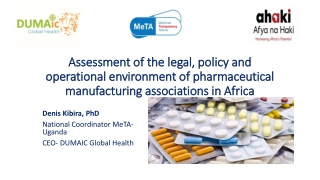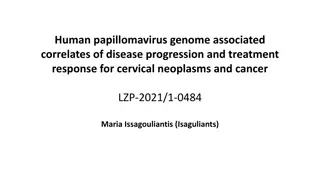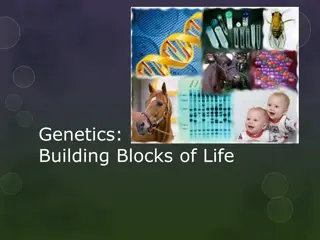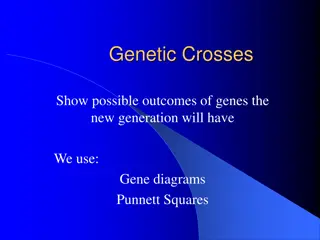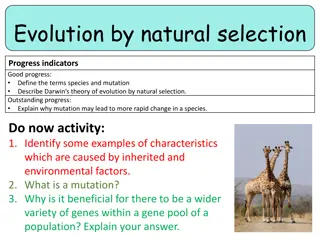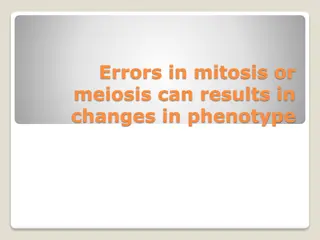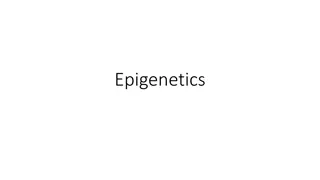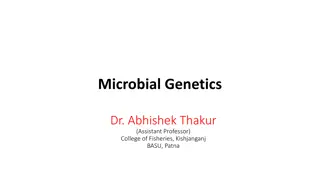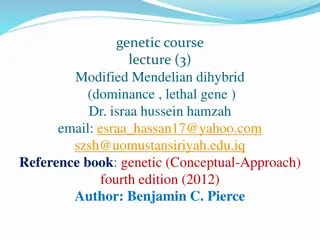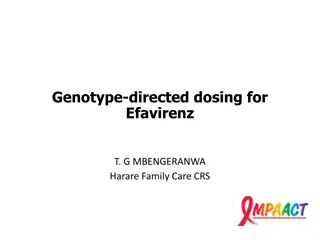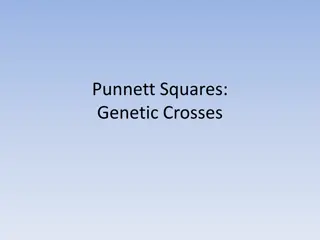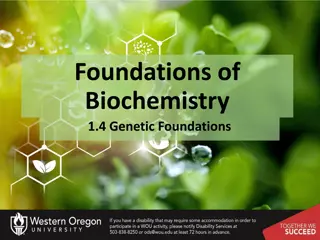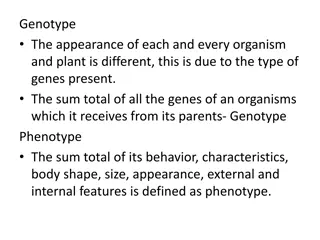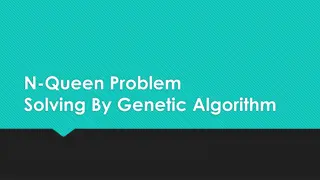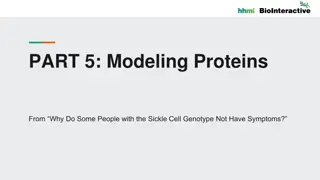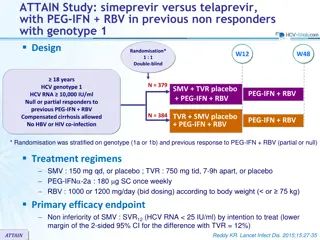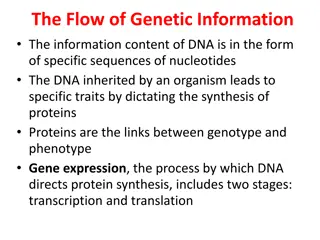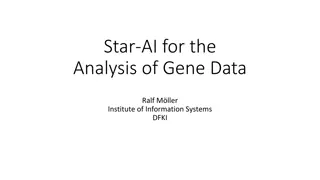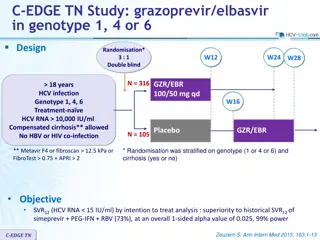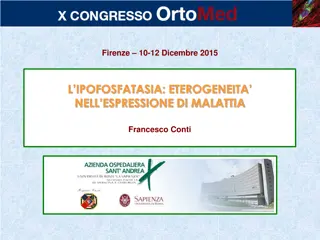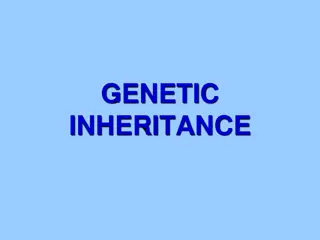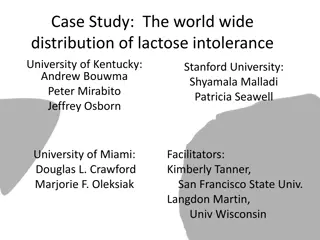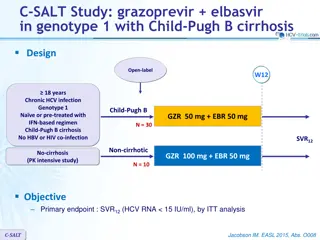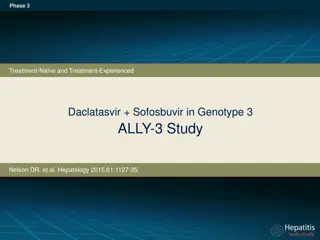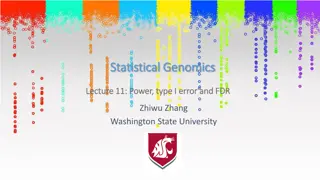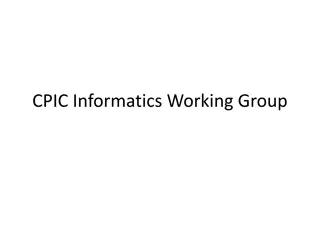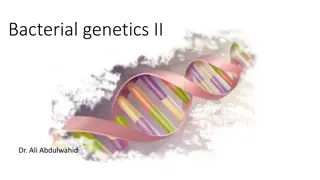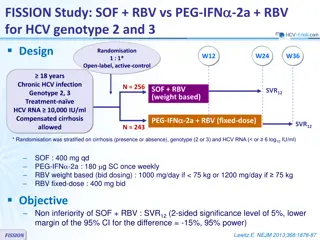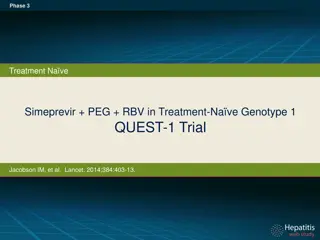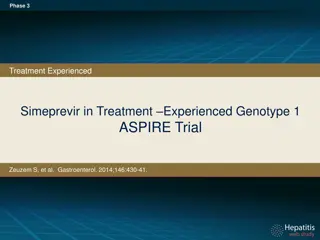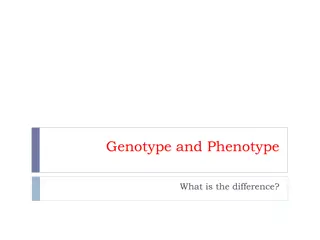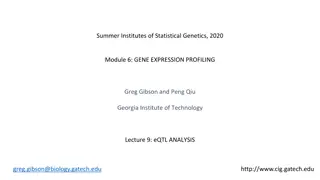Assessment of Pharmaceutical Manufacturing Associations in Africa
The assessment delves into the legal, policy, and operational environment of pharmaceutical manufacturing associations in Africa, highlighting key issues such as governance, finance, roles prescribed by frameworks, and engagement with governments and communities. The study utilizes qualitative metho
1 views • 16 slides
Investigating Human Papillomavirus Genomes in Cervical Neoplasms
This project focuses on studying the Human Papillomavirus (HPV) genome's association with disease progression and treatment response in cervical neoplasms and cancer. The research aims to genotype high-risk HPVs in healthy and diseased cervix, identify prevalent genotypes, detect genotype drift, cha
1 views • 13 slides
Genetics: The Blueprint of Life
Genetics is the study of heredity and how traits are passed from parents to offspring. It involves understanding genetic makeup (genotype) and physical attributes (phenotype) determined by genes. Mendel's laws of segregation and independent assortment explain how alleles and traits are inherited. Nu
0 views • 34 slides
Understanding Genetic Crosses and Inheritance Patterns
Discover the world of genetic crosses through gene diagrams and Punnett squares. Explore the terminology, genotype, phenotype, and the concepts of dominance and recessiveness. Learn how genes control characteristics like eye color, delve into allele combinations for flower color, and see possible ou
0 views • 15 slides
Understanding Evolution by Natural Selection
Explore the concepts of species, mutation, Darwin's theory of evolution, and the role of genetic variation through mutations. Learn how mutations can lead to rapid changes in species and why a wider variety of genes in a gene pool benefits a population. Delve into the effects of mutations on individ
0 views • 15 slides
Chromosomal Alterations and Their Impact on Phenotype
Errors in mitosis or meiosis can result in changes in phenotype, often due to alterations in chromosome structure such as deletion, duplication, inversion, and translocation. Nondisjunction can lead to abnormal chromosome number, resulting in disorders like aneuploidy. Polyploidy, with extra complet
0 views • 9 slides
Enhancing Professionalization of YEEs in Developing Countries through Evaluation Networks and Associations
This paper explores the crucial roles and sustainability measures of evaluation networks and associations in advancing the professional development of Young and Emerging Evaluators (YEEs) in developing nations. It discusses the objectives of strengthening these networks, enhancing YEE skills, and pr
2 views • 19 slides
Understanding Epigenetics: DNA Methylation and Histone Modification
Epigenetics involves modifications that impact gene expression without altering DNA sequences, playing a crucial role in the transition from genotype to phenotype. This includes DNA methylation, histone modification, and microRNAs. DNA methylation, controlled by DNMT enzymes, can lead to either gene
5 views • 12 slides
Understanding Microbial Genetics and Mutations in Organisms
Explore the world of microbial genetics with Dr. Abhishek Thakur, an Assistant Professor specializing in Microbial Genetics at the College of Fisheries, Kishjanganj, BASU, Patna. Learn about important concepts such as strains, clones, genome, phenotype, genotype, genes, genetic recombination, and mu
0 views • 19 slides
Understanding Dominance in Genetics: The Role of Alleles and Phenotypes
Dominance in genetics refers to the interaction of alleles at the same gene locus. Complete dominance occurs when one allele masks the effect of another in a heterozygous genotype, leading to a phenotype indistinguishable from the dominant homozygote. This concept is crucial for predicting genetic o
1 views • 18 slides
Genotype-Directed Dosing for Efavirenz in Children Study
The study focuses on genotype-directed dosing of Efavirenz in children with HIV, aiming to optimize treatment options and dosages based on genetic factors. It explores the challenges in treating children with HIV, especially in resource-limited settings, and discusses the impact of genetic variation
0 views • 21 slides
Understanding Punnett Squares and Genetic Crosses
Explore the world of genetics through Punnett squares and genetic crosses, where traits like eye color are predicted using Mendel's principles. Discover the laws of dominance, segregation, and how to determine genotype and phenotype ratios in offspring.
0 views • 23 slides
Understanding the Importance of Heredity and Genetics
Exploring the essential concepts of heredity and genetics, this content delves into the interplay between nature and nurture, the role of genetic code and DNA, and the mechanisms of inheritance. It highlights how genes influence behavior and the distinction between genotype and phenotype. Through vi
0 views • 21 slides
Understanding Genotype and Phenotype in Hereditary Traits
Exploring simple heredity through predicting and modeling phenotypes of Crazy Creatures, students are tasked with contrasting genotype and phenotype. The Crazy Traits lab data table is essential for recording alleles and genotypes, aiding in determining phenotypes for 14 different traits. By complet
0 views • 4 slides
Understanding Genetic Foundations and Protein Production in Biochemistry
Exploring the genetic foundations of biochemistry reveals how organisms evolve through natural selection and how phenotype and genotype are interconnected. The process of gene expression plays a crucial role in determining an organism's phenotype. Additionally, protein production through translation
0 views • 17 slides
Understanding Transcription and Gene Expression in Biology
Explore the intricate process of transcription in biology, where mRNA is synthesized from DNA to carry the genetic code for protein production. Learn about the connection between genotype and phenotype, the role of genes in protein synthesis, and the significance of terms such as RNA Polymerase, int
0 views • 16 slides
Understanding Genotype and Phenotype: The Genetic Basis of Organism Variation
Genotype determines the genetic makeup of an organism, while phenotype encompasses its observable traits. Johannsen's theory states that phenotype is a result of genotype, which remains constant throughout life. The concept of phenocopy refers to mimicking another phenotype without altering the geno
0 views • 15 slides
Solving N-Queen Problem Using Genetic Algorithm
Solving the N-Queen problem involves placing queens on a chessboard in such a way that they cannot check each other. The genetic algorithm approach addresses this problem through representations like phenotype and genotype, fitness evaluation based on queen penalties, mutations involving permutation
0 views • 8 slides
Maternal Effect on Shell Coiling in Snails
Maternal effects play a crucial role in determining the coiling direction of snail shells. The maternal inheritance of organelle genes controls certain traits in offspring, with the direction of shell coiling being a classic phenotype exhibiting maternal effects. The genotype of the female parent de
0 views • 7 slides
Exploring Protein Modeling in Sickle Cell Genotype
Dive into the world of protein modeling to understand why some individuals with the sickle cell genotype remain asymptomatic. Explore amino acid sequences, build typical and sickle cell protein segments, and visually represent the changes in protein structure. Hands-on instructions guide you through
0 views • 6 slides
Comparison of Simeprevir vs. Telaprevir in HCV Genotype 1 Non-Responders
The ATTAIN study compared simeprevir and telaprevir in previous non-responders with genotype 1 HCV. The study included 379 patients with simeprevir and 384 with telaprevir, focusing on SVR12 as the primary endpoint. Baseline characteristics, treatment regimens, patient disposition, and virologic out
0 views • 6 slides
Understanding the Flow of Genetic Information
The flow of genetic information involves the transmission of DNA content into specific protein synthesis through the processes of transcription and translation. Genes dictate the traits of an organism by directing the production of proteins, which serve as the connection between genotype and phenoty
0 views • 15 slides
Star-AI for Genetic Data Analysis: Incorporating Knowledge in Statistical Modeling
Knowledge-based approaches are crucial in genetic data analysis to enhance the accuracy and scope of genome-wide association studies (GWAS). Stochastic Relational AI (Star-AI) offers a solution by leveraging probability theory and First Order Logic to capture complex genetic interactions. By integra
0 views • 10 slides
C-EDGE.TN Study: Grazoprevir/Elbasvir in Genotype 1, 4, or 6 - Treatment for HCV Infection
The C-EDGE.TN Study evaluated the efficacy of grazoprevir/elbasvir treatment in patients with HCV infection, specifically genotype 1, 4, or 6. The study included 316 patients and aimed to achieve SVR12 rates superior to historical standards. The treatment was well-tolerated, with high SVR12 rates ac
0 views • 9 slides
Understanding Heterogeneity in Hypophosphatasia: A Case Study in Phenotypic Variability
This case study explores the diverse expression of hypophosphatasia in a Caucasian female patient, highlighting the challenges in diagnosis and treatment. The patient presented with chronic pain, fractures, myopathy, and dental issues, underscoring the complexity of genotype-phenotype correlations i
0 views • 23 slides
Understanding Genetic Inheritance and Reproduction
Delve into the world of genetic inheritance and reproduction through topics such as gametes, fertilization, allele definition, genotype versus phenotype, dominant versus recessive traits, and the process of sexual reproduction. Explore how genetic information is passed on from parents to offspring,
0 views • 41 slides
Understanding Genetic Mechanisms and Lactose Intolerance Distribution
Explore the genetic foundations of lactose intolerance through a comprehensive study on gene concepts, transcription and translation mechanisms, regulation processes, and phenotypic outcomes. Engage with learning goals focused on genotype-phenotype relationships, scientific processes, and the unique
0 views • 15 slides
Study on Grazoprevir and Elbasvir in Genotype 1 with Child-Pugh B Cirrhosis
The C-SALT study evaluated the efficacy of grazoprevir and elbasvir in patients with genotype 1 chronic HCV infection and Child-Pugh B cirrhosis. The primary endpoint was achieving sustained virologic response at 12 weeks. The study included treatment-naive and pre-treated patients with IFN-based re
0 views • 7 slides
Guide on Using BLINK C Version for Genetic Analysis
This guide provides step-by-step instructions on how to effectively use the BLINK C version for genetic analysis. It covers tasks such as preparing input files, handling phenotype and covariates data, implementing GWAS using BLINK, transforming genotype data, compressing to BLINK binary format, conv
0 views • 9 slides
Effectiveness of Daclatasvir and Sofosbuvir in HCV Genotype 3: Insights from ALLY-3 Study
Study on the efficacy of Daclatasvir and Sofosbuvir in treating Hepatitis C Virus (HCV) Genotype 3, involving treatment-naive and treatment-experienced patients. The Phase 3 trial showcased promising results in achieving SVR12, with detailed patient characteristics, drug dosing, and baseline charact
0 views • 10 slides
Understanding Power, Type I Error, and FDR in Statistical Genomics
Explore concepts of statistical genomics in Lecture 11 focusing on power, type I error, and false discovery rate (FDR) in GWAS analysis. The content covers simulations of phenotype from genotype data, GWAS by correlation, resolution and bin approach, and implications on QTN bins for power and error
0 views • 21 slides
CPIC Informatics Working Group Overview
The CPIC Informatics Working Group focuses on the informatics aspects of CPIC guidelines and the clinical implementation of pharmacogenetics. This group aims to support the adoption of CPIC guidelines by addressing technical barriers and creating translation tables from genotype to phenotype to clin
0 views • 7 slides
Understanding Genetics: Concepts of Heredity, Mitosis, Meiosis, and DNA
Genetics is the study of heredity and genetic variations, involving terms like genotype, phenotype, homozygous, heterozygous, dominant, and recessive. Mitosis and meiosis are key processes in cell division, each with specific phases and functions. DNA, or Deoxyribonucleic Acid, stores and transmits
0 views • 14 slides
Understanding Bacterial Genetics: Phenotypic and Genotypic Variability
Phenotypic and genotypic variations in bacteria are crucial for their adaptation and survival. Phenotype reflects the physical expression influenced by both the genome and the environment, while genotype represents the hereditary constitution passed to offspring. Mutations are a primary source of ge
0 views • 23 slides
Comparison of SOF+RBV vs PEG-IFN-2a+RBV for HCV Genotype 2 and 3 Treatment
FISSION Study compared the efficacy of SOF+RBV and PEG-IFN-2a+RBV for HCV genotypes 2 and 3 in treatment-naive patients with chronic HCV infection. The study included 256 participants in the SOF+RBV group and 243 in the PEG-IFN-2a+RBV group. The primary objective was to determine the non-inferiority
0 views • 6 slides
Simeprevir Combination Therapy in Treatment-Naïve HCV Genotype 1 Patients: QUEST-1 Trial Results
The QUEST-1 trial evaluated the efficacy and safety of simeprevir in combination with peginterferon and ribavirin versus peginterferon and ribavirin alone in treatment-naïve patients with chronic HCV genotype 1 infection. The study showed a significantly higher proportion of patients achieving sust
0 views • 14 slides
Simeprevir Treatment in HCV Genotype 1: ASPIRE Trial Results
The ASPIRE trial evaluated simeprevir treatment in patients with treatment-experienced chronic HCV genotype 1 infection. The study design included different dosing regimens of simeprevir with peginterferon and ribavirin, compared to placebo. Results showed varying sustained virologic response rates
0 views • 9 slides
Understanding Genotype and Phenotype in Genetics
Genotype refers to the genetic code responsible for specific traits, while phenotype is the outward appearance and characteristics of an organism. Traits can be dominant or recessive, with alleles representing the possible choices for a characteristic. Genotypes consist of two letters, one from each
0 views • 7 slides
Understanding Mendel's Genetic Vocabulary
Explore essential genetic terms such as Trait, Gene, Allele, Genotype, Phenotype, Dominant Allele, Recessive Allele, Heterozygous, and Homozygous in the context of Mendel's groundbreaking work on inheritance patterns. Understanding these terms is crucial for comprehending how genetic traits are pass
0 views • 14 slides
Understanding eQTL Analysis in Gene Expression Profiling
This module delves into Expression QTL (eQTL) analysis, which links genotype to phenotype through transcript abundance modulation. The complexity of eQTLs, including cis vs. trans regulation, clustering, and the genetic component of transcription, is explored. Meta-analyses and tools like GTEx provi
0 views • 19 slides
